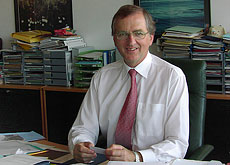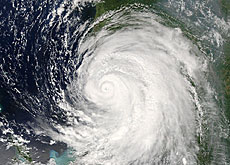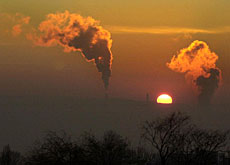Environment chief calls for greener lifestyle

The outgoing head of the federal environment agency tells swissinfo Switzerland has made big strides in environmental protection but still has far to go.
Philippe Roch is standing down at the end of September after 13 years in the job and is set to be replaced by his deputy Bruno Oberle.
He said the only way of reducing harmful emissions substantially was through a mixture of technological progress and a change in lifestyle.
swissinfo: Have you achieved what you set out to do?
Philippe Roch: There are some areas where we have made major progress in environmental policy. I’m thinking about waste where our legislation has been very progressive and it has been well implemented by the cantons and the private sector. We now no longer have landfill sites filled with waste, which have not been fully treated and neutralised. And we have a high level of recycling of different materials.
In a different area – climate change – we have made very important steps early on, which correspond to our international engagements. We have a law on CO2, which is now being implemented, and parliament will discuss the introduction of taxation to foster a reduction in emissions. It’s clear that we still have much more to do but in the area of CO2 and energy the environment [policy] has played a very progressive role.
swissinfo: Would you talk of failures?
P.R.: Yes, we should do much more. I think environmental legislation per se is quite progressive but if you take traffic, the impact on the environment is growing very fast. Even though Switzerland has invested a lot of money in developing the railways we still have growth in traffic.
Noise is really a big problem. We are working on reducing noise emissions in industry, vehicles etc., but what we are mainly doing is building walls and windows against the noise, and that’s not sufficient. We should really change our policy and, at the level of emissions, work on the norms and standards for vehicles. That needs Europe-wide consensus and my estimation is that we are not working enough in that direction.
Secondly we should work on people’s behaviour. You have a small proportion of people driving very loudly and disturbing thousands of people every day. I see a big challenge for the future in trying to reintroduce the notion of respect in society that should help restore a better environment.
swissinfo: You’re leaving on a low note, with your agency suffering cutbacks that threaten its future activities. Isn’t that a blow to everything you’ve worked for over the past 13 years?
P.R.: I have the impression I’m quite respected as a director, because people know that I am committed to the environment and very loyal to the legislation, the government and parliament. My personal relationship with parliament has been very positive. So I don’t consider it a condemnation of my work. It was more, I would say, pressure to save money within the federal administration.
And clearly the environment is often in conflict with other interests because if we want to protect nature we have to limit construction and impose standards.
I have the impression it was just a moment of crisis that is not in the long-term an attack on the environment.
swissinfo: You came to office in 1992 – the year of the Rio Earth Summit, which put the environment high on the agenda. In recent years other concerns have pushed it down the agenda. Do you not find that rather disheartening?
P.R.: Yes, clearly. Politics has become very short-term oriented and I regret that the environment is not taken into consideration more because it is a fundament of this country, of its success economically and socially. But I’m confident that the importance of the environment for the economy and for the country will be recognised again in coming years.
After the bad weather and floods in Switzerland and the United States, people are beginning to think that there is a relationship between nature and humankind. And that can help us reconsider the importance of environmental protection.
swissinfo: Looking to the future, discussions are underway on a successor to the Kyoto Protocol. What do you hope for from a new accord?
P.R.: I think we should rely on the [1992 United Nations] Convention on Climate Change, which goes further than the Kyoto Protocol. The convention commits us to stabilise emissions at a level that is not dangerous. If we want to achieve that we have to go much further than the Kyoto Protocol. We have to reduce the emissions of industrialised countries by 80 per cent. That means a totally different way of living and huge technological progress.
What we have to do after Kyoto is set new targets for the next ten years. But knowing that we have to go much further and that some big countries do not want to set targets, we have to look for new ideas. Probably we have to look at two ways: the first being technological progress, the second that we challenge our way of life, which is much more difficult. But I don’t see any other way than a new attitude and responsibility towards the environment and future generations. Politics cannot do this by itself, we have to work within society to change it.
swissinfo-interview: Morven McLean
The Swiss parliament ratified the Kyoto Protocol in June 2003.
Under Kyoto, Switzerland has pledged to reduce CO2 emissions from fossil fuels to 10% below 1990 levels by 2010.
It has also pledged to cut emissions by 1.8 million tons a year between 2008 and 2012.
To this end a surcharge has been imposed on heating oil and a climate tax will be levied on petrol and diesel from October 1.
Philippe Roch has been director of the Swiss environment agency since 1992. He is stepping down at the end of September to be replaced by his deputy, Bruno Oberle.
A committed environmentalist, Roch was previously head of WWF Switzerland.
He is currently considering an offer from Geneva University to contribute to the creation of a new institute on the environment and sustainable development. On an international level, he has been asked to participate in advisory boards on the environment.

In compliance with the JTI standards
More: SWI swissinfo.ch certified by the Journalism Trust Initiative


You can find an overview of ongoing debates with our journalists here. Please join us!
If you want to start a conversation about a topic raised in this article or want to report factual errors, email us at english@swissinfo.ch.